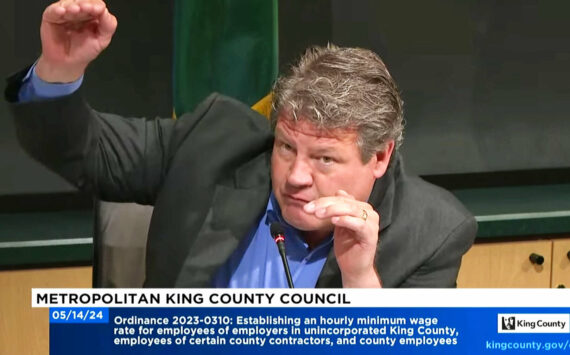With mere days remaining until November 2, I’m waking up each morning with a recurring thought: “What can I do today to help defeat George W. Bush?”
The answer, unfortunately, is not very much. We happen to live in one of those 40 or so states where one or another candidate—in Washington, it’s Kerry—is comfortably ahead in the polls. We actually have a special term, “swing state,” to note places where votes mean something. Elsewhere, even if this were Afghanistan—where, in this month’s election, people were routinely registering and voting 10 or more times—it would all be redundant. The candidates came to our non-swing states earlier in the campaign, mostly to raise money. These days, we’re irrelevant. The Republicans have been putting their advertising dollars elsewhere.
For this, we may thank the Electoral College, that accursed 18th century relic that we seem to be permanently stuck with as an intermediary between the popular vote and the White House. Our founding fathers didn’t much trust democracy; it was a huge leap from the concept of the divine right of kings, and so they hedged their bets. The Senate wasn’t originally directly elected, and neither was the president. Both were left to the hands of state legislatures. In the case of the presidency, the now-familiar formulation of electors was a last-minute compromise by weary constitutional delegates eager to adjourn.
A lot has changed since 1789. We’re no longer a pre-industrial, agrarian society surrounded by wilderness. And while much of our Constitution remains remarkably functional so many years later, we elect our senators now and we’ve expanded the right to vote from its original limitation to landed white men. The Electoral College is a remnant of a bygone era.
Ironically, the very problem with the Electoral College is the reason it will never be abolished: the disproportionate influence of smaller states. In 1790, the differential between the most populous (Virginia) and least populous (Delaware) states was a ratio of about 10:1. Today, the ratio between California and Dick Cheney’s home state of Wyoming is 70:1; the ratio of their electoral votes is only 18:1. Presidential votes in Wyoming, Alaska, Vermont, Delaware, Montana, and the Dakotas thus now count five times what they do in California. And as we urbanize, the gap is widening.
Alas, those same tiny states would likely have to sign off on any constitutional amendment to move to a popular vote—a reminder, once again, that America’s version of a republic is less democratic and less functional than most other Western democracies. But there is a fix. Two states, Maine (four electoral votes) and Nebraska (five), have moved to apportion their votes by the outcome of the race in each congressional district. In this system, if a state has 10 districts and six go for Bush, the winner would get six of the 10 electoral votes, plus two (representing the two senate seats) to the overall winner—not all 12, as is currently the case.
This is, effectively, a form of proportional representation. But it’s not real representation—a system whereby 67 percent of the popular vote, not a majority in each of six congressional districts, would be needed to earn eight of 12 electoral votes. And as we learned in the court case Bush v. Gore in 2000, not only can the winner of the popular vote lose the presidency, we don’t even have a fundamental constitutional right to cast a vote for president; we do so strictly upon the sufferance of our state legislatures.
Hence, we have this electoral season’s irritating calculus: the only opinions that seem to count are those of undecided voters in Florida, Ohio, and half a dozen other swing states. On their shoulders rests the outcome of the 2004 election. It’s gotten to the point where I actually got spam the other day touting discount airline tickets to swing states for citizens who want to make a difference. A friend of mine who lives near Tampa says his state is crawling with self-appointed election monitors and out-of-state party volunteers, all descending upon the hapless Florida voter. By contrast, nobody much cares what voters in Los Angeles or New York or Seattle think.
It’s axiomatic that the highest voter turnouts come in presidential years; it’s the race that holds the most interest for the most people. So it’s sad that our process for selecting that leader is so badly flawed. With the enormous sums of money raised and spent (much of it by big business), the irrelevance of the popular vote, and the choice, once again this time, between two wealthy white male sons of privilege, in a country where that only describes a tiny fraction of the population, it’s pretty damned depressing. The process needs to be opened up; third, fourth, fifth, and sixth party candidates need to be heard. And don’t even get me started about the debates.
Nonetheless, for the moment, it’s the system we have. And I have a daily pledge to fulfill.
Don’t forget to vote to defeat George Bush on Nov. 2.






